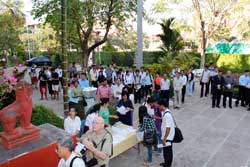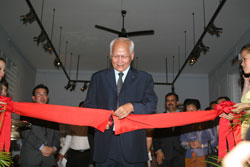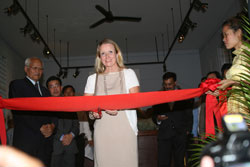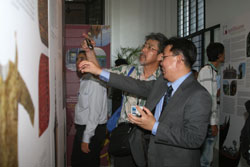|

OUR COMMON HERITAGE
February 19 – July 31, 2013
A special exhibition entitled “Our Common Heritage: Exploring World Heritage Sites of Cambodia, Laos and Viet Nam” that inaugurated on 19 February 2013 is one of the result of UNESCO-Japan Fund in Trust project called“Revitalizing World Heritage Site Museums in Cambodia, Laos and Viet Nam”. The project was launchedon July 2011 and followed by two regional workshops, the first in Hanoi ( in 2011) and the second in Siem Reap (in 2012), with participants from the nine museums – National Museum of Cambodia, Preah Norodom Sihanouk Angkor Museum, Angkor National Museum, Preah Vihear Eco Global Museum from Cambodia, Thang Long Imperial Citadel site museum, My Son Interpretation Center, Da Nang Cham Sculpture Museum, Ho Citadel site Museum from Vietnam, and WatPhu Museum from Laos.
The exhibition “Our Common Heritage: Exploring World Heritage Sites of Cambodia, Laos and Viet Nam” will be organized at the above mentioned four museums in Cambodia. For Cambodia, this is the second inauguration of this kind- the first inauguration was held in December 2012 at the Preah Norodom Sihanouk Angkor Museum in Siem Reap. The other two exhibitions at Angkor National Museum and Preah Vihear Eco Global Museum are planned to be inaugurated this year as well.
The exhibition is composed of four groups of panels – The first introduces the concept of the World Heritage Convention, its history and the location of the participating World Heritage sites and museums, as well as Outstanding Universal Values of these sites; the second and third groups of panels showcase the commonly developed themes such as Nature and Myth and Trade and Exchange, and the last group shows a theme specially created by the museum itself – Khmer Ornament.
In addition to the exhibition, the National Museum of Cambodia, as well as other eight participating museum in this project will run an education program with school children until the end of June 2013.
The aim of this exhibition is to provide visitors with new narratives by shedding light on the historical interconnection between various World Heritage sites and related populations of sub-region.
| 







